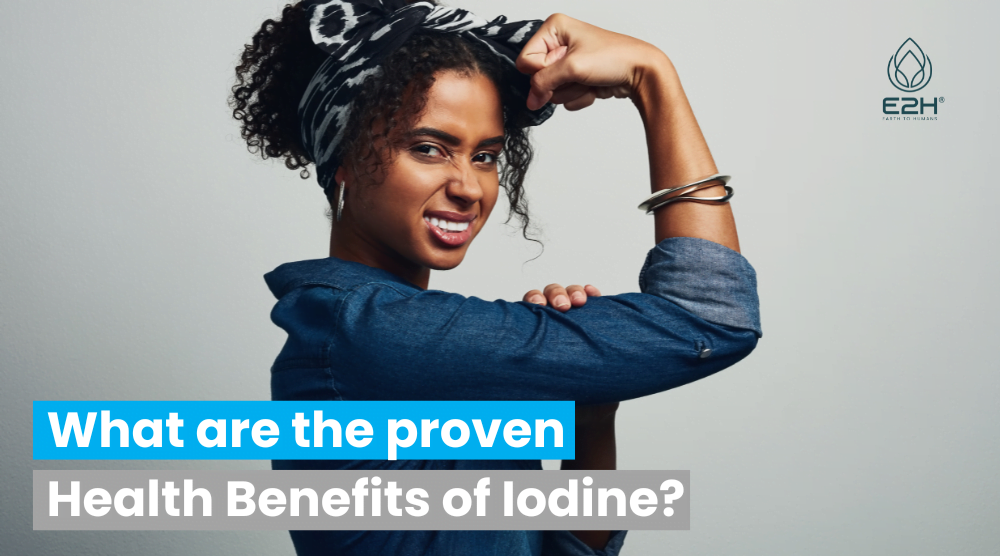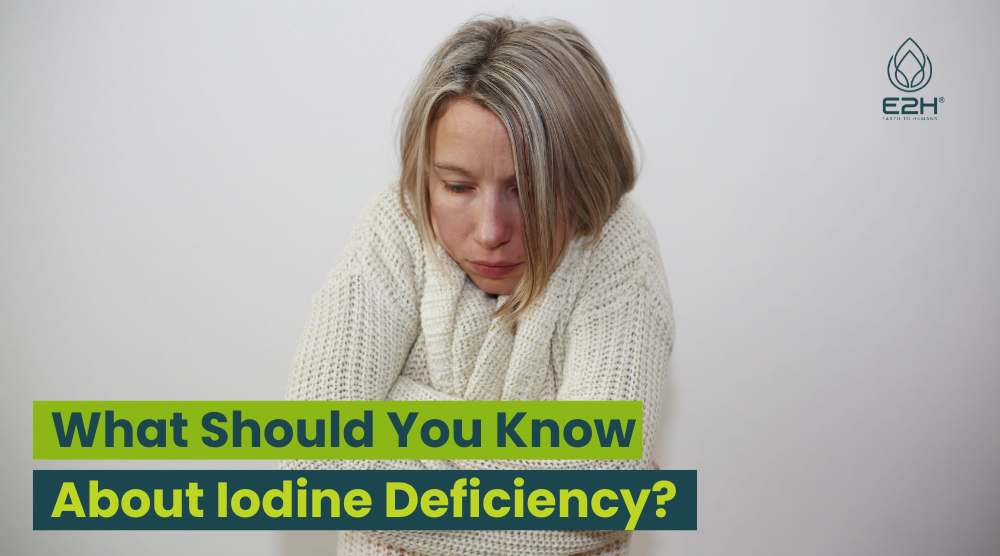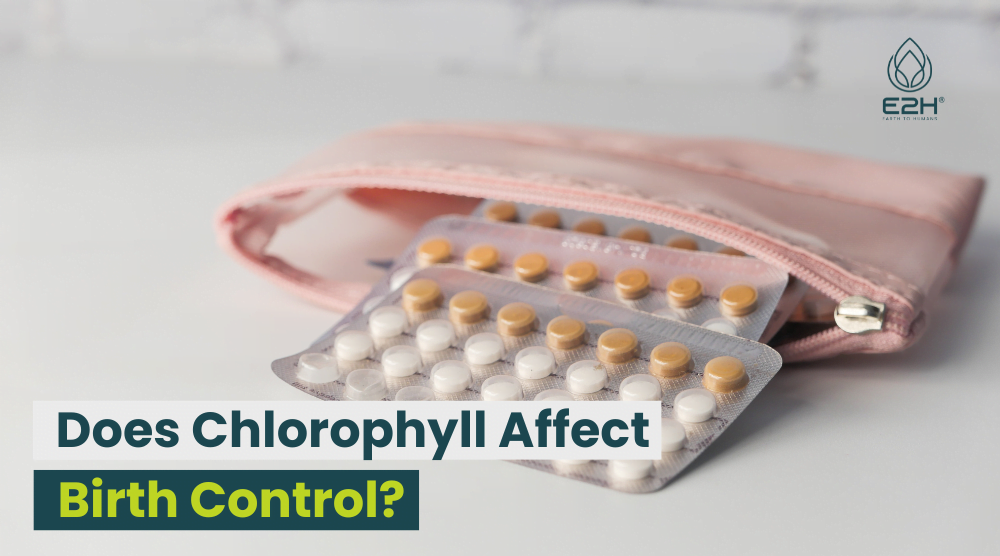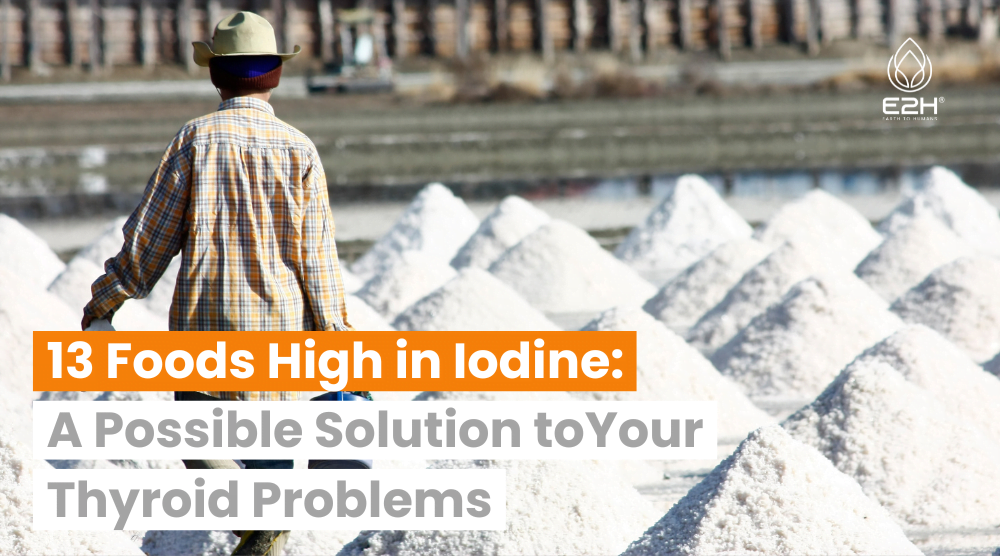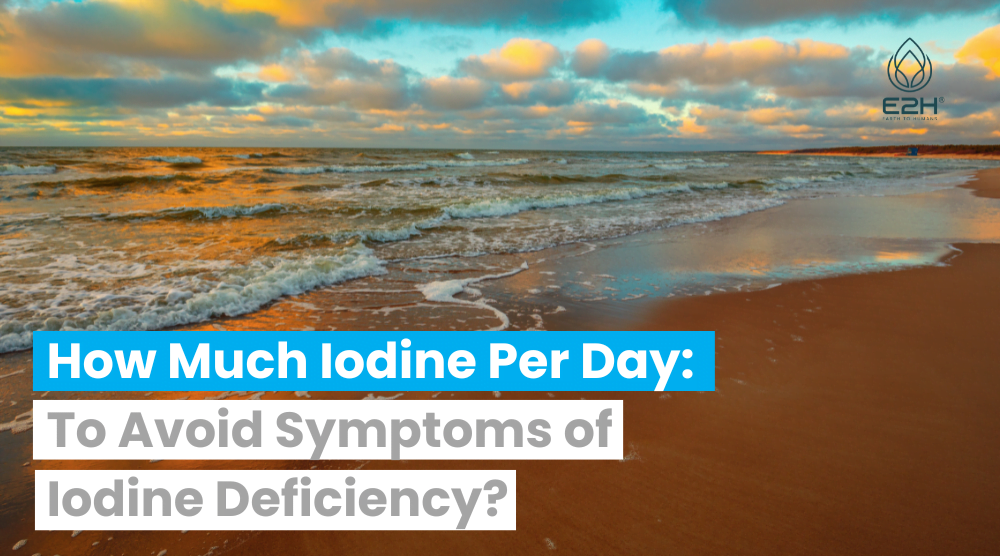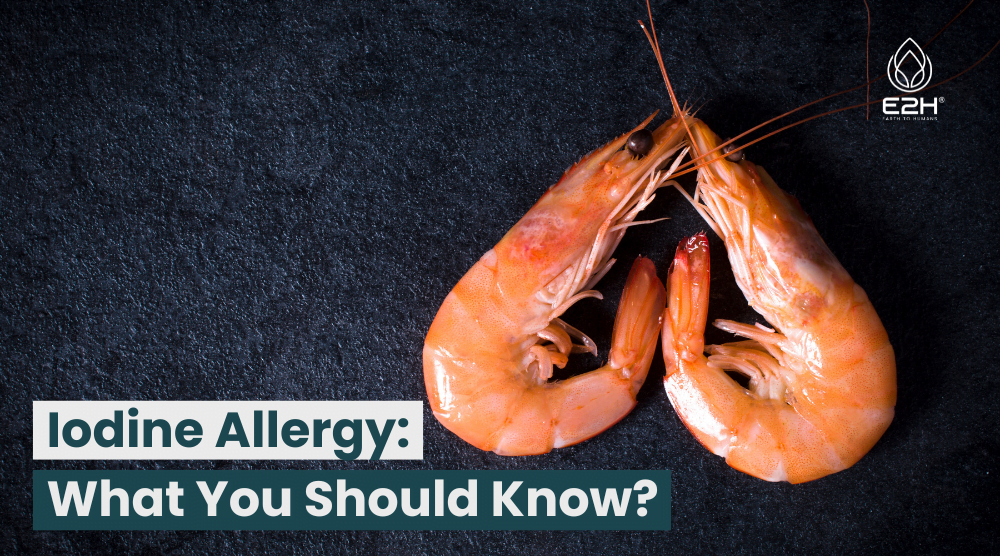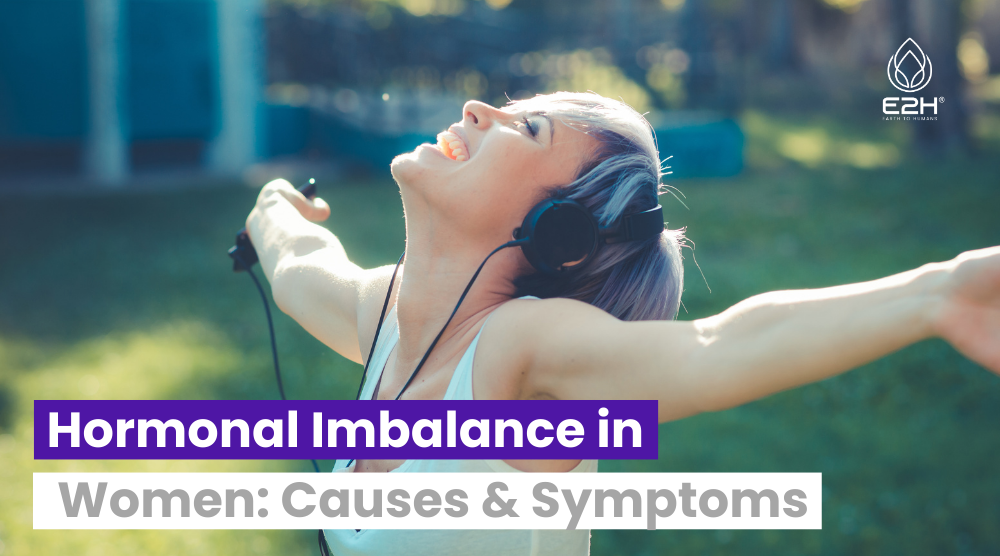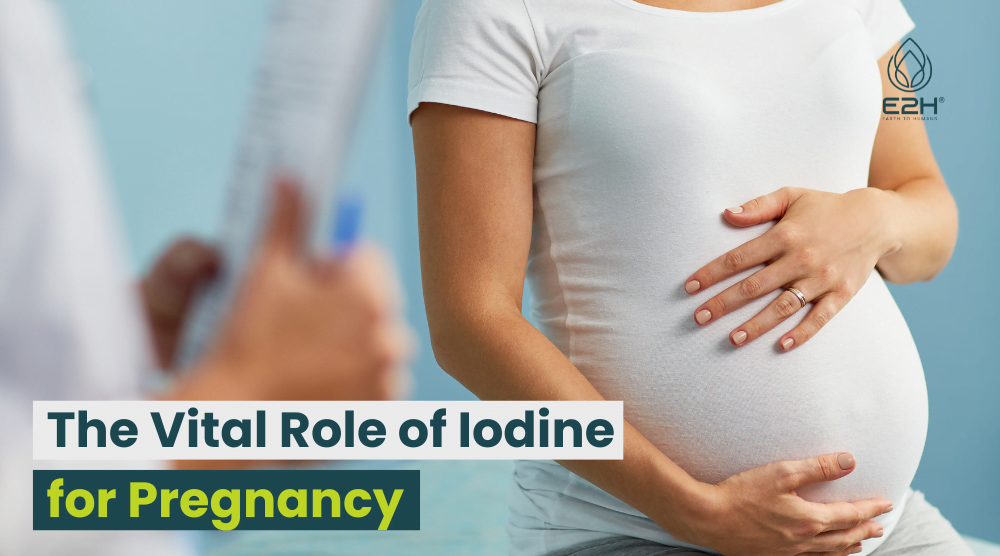Iodine is an essential mineral that your body needs to function properly. Most importantly, your thyroid gland uses it to form hormones responsible for maintaining body growth and metabolism [1]. Unfortunately, about a third of the world’s population is known to have a deficiency in iodine [2].
During the past few years, several campaigns have resulted in a decline in the prevalence of deficiency of iodine. But unfortunately, there is still a large group of people that are suffering from this condition. The reason behind that is the lack of awareness among the general public related to the benefits of iodine.
In this article, you will learn some incredible health benefits of iodine and the risks associated with excessive iodine intake.
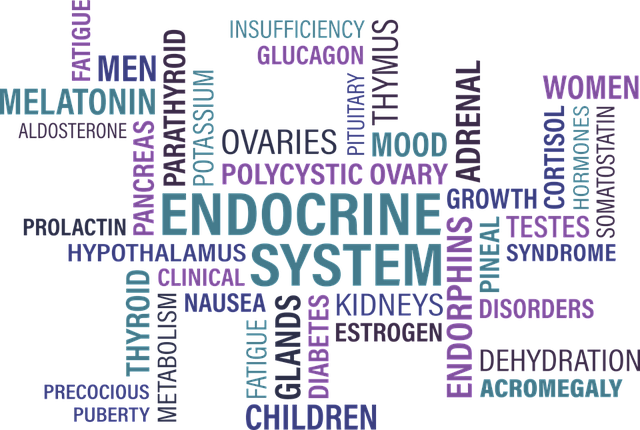
What is Iodine?
Iodine is a trace mineral naturally found in the soil and seawater. This is why sea and plant foods contain a rich amount of iodine. However, not all people eat enough of these foods to get the recommended amount of iodine.
The most significant source of iodine for you is iodized salt. However, if your body has low iodine levels, you can also use iodine supplements advised by health professionals.
What are the Health Benefits of Iodine?
Iodine is an essential mineral known to have multiple health benefits. Some of the important ones include proper fetal development during pregnancy and healthy functioning of the thyroid gland.
Here, you will learn a long list of the essential health benefits of iodine.
Production of thyroid hormones
You have a gland in front of the base of your neck that produces one of the most essential hormones regulating multiple body functions. Your body produces thyroxine (thyroid hormone) after several chemical reactions using iodine and an amino acid known as tyrosine.
Without iodine, your body cannot produce thyroxine and perform those functions effectively.
Reduces the risk of goiter
Goiter is a medical term used to describe enlarged thyroid. It can be because of the deficiency of iodine in your diet. Therefore, eating iodine-rich foods or iodized salt more frequently can help you reduce the risk of goiter.
Used to treat fibrocystic breast disease
Fibrocystic kidney disease involves painful lump formation in the breast tissue. It is common in women of reproductive age.
Iodine may prove beneficial in this condition. However, don’t use iodine supplements before asking your healthcare provider. As too much iodine can lead to toxicity.
Used to treat thyroid cancer
According to the authorities, radioactive iodine can effectively treat thyroid cancer [3]. After its uptake into the thyroid gland, radioactive iodine produces radiation that destroys the cancerous tissue. However, in some cases, the only treatment for thyroid cancer is removing the cancerous tissue by surgery.
Improve the cognitive function
According to a clinical study, children who consume the recommended amount of iodine tend to have better cognitive function [4]. In contrast, a deficiency of iodine can lead to intellectual disability. A possible explanation of this effect is thyroxine’s role in the nervous system’s growth and development.
Liquid Iodine for Infections
Have you ever visited the hospital after a minor fall to get treatment for mild cuts and scrapes? In such conditions, the staff often applies a liquid to the injury site to prevent bacterial growth, which can lead to wound infections. The solution is liquid iodine which kills bacteria through its bacteriostatic effects.
However, you should avoid using this liquid on babies, animal bites, and larger cuts, as it can also damage your normal cells.
Promotes Brain Health during Pregnancy
Maternal iodine supplementation is an essential component of the diet during pregnancy. You need more iodine during pregnancy to promote the development of the nervous system of the baby.
According to peer-reviewed studies, babies born to mothers with iodine deficiency tend to have low IQ [5]. In simple words, a deficiency of iodine during pregnancy can lead to poor brain development.
Iodine also has a role in promoting the health of breast tissue. You must also monitor your iodine intake when breastfeeding, as breast milk is one way to transfer iodine to your nursing infant.

What are the Symptoms of Iodine Deficiency?
As mentioned before, about one-third of the world’s population has an iodine deficiency. This problem is usually rare in the US, where they have recommended amount of iodine in their diet. However, certain regions, such as South Asia and some part of Europe, has too little iodine in their soil, making these regions endemic to problems of iodine deficiency.
Moreover, there is an increased demand for iodine during pregnancy. Therefore, pregnant women are also at high risk. Finally, people who don’t use iodized salt or eat a vegetarian diet also have this problem.
Iodine is the mineral responsible for producing thyroxine in the body. Therefore, long-term iodine deficiency in diet causes symptoms similar to what people usually experience in hypothyroidism. These symptoms often make people uncomfortable and must be addressed immediately to prevent long-term damage.
If you are wondering about the symptoms, read the following list to learn about this problem.
Neck Swelling
When your body needs thyroxine, the brain produces thyroid-stimulating hormone (TSH). It acts on the thyroid gland, which uses iodine to produce thyroxine [6]. These hormones perform their function, for example, the maintenance of the body’s metabolism. This is how your body functions in the usual circumstances.
However, in the case of iodine deficiency, TSH stimulates the thyroid gland, but there is no increased production of the hormones. The result of that is the growth of the gland, which becomes visible as neck swelling.
You must not be negligent about this swelling, as it can permanently damage the thyroid gland. You can quickly reverse the swelling if diagnosed early by using iodine-rich foods in your diet.
Weight gain
If you gain weight despite not overeating, there is a chance that your iodine intake is low compared to what your body demands. The deficiency of iodine leads to poor thyroid function, which slows down the body’s metabolism leading to unnecessary fat deposition.
Metabolism is the natural process through which your body converts food into energy. However, the body needs proper signaling to do that. With limited thyroid hormone production, your body cannot burn calories at the required rate. Unfortunately, this results from the deposition of unhealthy fat on the body.
The solution to this problem is similar to what you learned in the article. Simply taking enough iodine in your diet can solve this problem.
Hair Loss
Most of you do not know that the thyroid gland hormones are essential for developing hair follicles and hairs. Therefore, when your body has low iodine or iodine-containing hormones, the hair follicles start deteriorating until hair fall begins [7].
However, not all people with iodine deficiency experience this symptom. Experts also say that hair loss due to poor thyroid condition only occurs in those with a family history of this problem. But, if you notice any unnecessary hair fall, try adding potassium iodide to your diet.
In addition to hair fall, people experience dry and scaly skin due to defective sweating. Usually, sweat keeps the skin’s surface moist and prevents its scaling. However, low thyroxine levels are associated with inadequate sweating, a common cause of dry, scaly skin.
Feeling Cold
Have you ever experienced a cold body, even in Summer? It can happen in people with iodine deficiency. These people used to turn off the fans and air-conditioners even on hot summer days. Let me tell you one thing. It is the most common symptom of hypothyroidism that can occur when you need more iodine than what you are taking.
About 80% of people with iodine deficiency feel more sensitive to cold temperatures than usual [8]. The mechanism of this problem is quite simple, and a simple basic understanding of the body’s metabolism can help you understand the issue.
When your body breaks down the food to extract energy, some energy gets lost in heat that helps regulate the body temperature. However, there is an increased risk of hypothyroidism in goiter endemic areas. In such individuals, body metabolism gets slower. As a result, the body’s metabolism gets defective, leading to poor temperature regulation.
In simple words, poor iodine sources lead to low hormone production, which ultimately results in high sensitivity to cold temperatures.
Heart Rate Problems
The thyroid hormone also controls the pumping activity of the heart. Underactive thyroid is associated with slower heart rates and vice versa. Therefore, the body needs to tightly control the levels of thyroid hormones, which would otherwise damage heart health.
In hypothyroidism (underactive thyroid), deficiency of the presented mineral results in a slower heart rate. People often feel lethargic due to poor pumping of the heart. Most people need thyroxine-containing medicines to maintain their heart rate. However, eating iodine-rich foods can be a perfect solution in the early stages.
However, you must consult a health professional before taking excess iodine, which can lead to toxicity.
Fatigue and Low Energy
Fatigue and having low energy in your body are also common symptoms. It’s because of the same reason why people experience high sensitivity to cold. Low metabolism cannot give the body enough energy to do routine work. Therefore, 80% of people with iodine deficiency feel sluggish and weary throughout the day.
Menstrual Irregularities
In addition to various purposes, good thyroid function is also associated with regulating the reproductive system and hormones. Iodine is needed for thyroid hormone production. Therefore, iodine deficiency leads to an imbalance in reproductive hormones, leading to heavy and irregular menstrual bleeding [9].
How much potassium iodide should you take daily?
Centers for Disease Control has recommended different values of potassium iodide for different age groups. Here is a brief account of the amounts of potassium iodide that you need to take daily to prevent iodine deficiency [10].
Infants of 1 month need to take only 16 mg of KI daily to cover the daily requirements of iodine.
Children of 1 month to 3 years need 32 mg of KI.
The daily KI requirement for children or adolescents from 3 years to 18 years is 65 mg.
After 18 years, people need to take 130 mg of KI daily for the rest of their lives.
The demand for iodine is high during pregnancy and breastfeeding. Therefore, pregnant women need 130 mg of KI per day regardless of age.
Learn more about the required daily dose of iodine here.
What are the Different Sources of iodine?
There are only a few foods that are rich in iodine. This is the reason why deficiency of iodine is common all around the globe. According to recommendations, people should ingest 150 micrograms of iodine from different food sources. However, this demand exceeds 290 micrograms during pregnancy and breastfeeding.
Even though there are only a few good sources of this mineral, some foods contain rich amounts. Dairy products such as yogurt, seaweed, eggs, shrimp, seafood, and iodized salts remain among the top natural sources of iodine.
Iodine supplements: Tablets or Liquid?
Iodine supplements are present in two forms, tablets and liquid.
According to FDA-approved guidelines, KI tablets are present in two strengths. One is 130 mg, and the other one is 65 mg. You must be wondering what to do to supplement children as they require much less than these tablets. Therefore, you can cut these tablets into smaller pieces for lower doses. For example, for children of 1 month to 3 years, you can use half of the 65 mg tablet.
There is another solution to this problem, as you can use liquid iodine for supplementation, which is a far better option. The solution offers better absorption of iodine and is also not associated with any damage to the gastrointestinal tract [11]. Moreover, the tale of the benefits of liquid iodine doesn’t end here. According to a clinical study, individuals with hypothyroidism respond much better to liquid iodine supplementation than tablet ones [12].
You must remember that iodine supplements are needed for conditions when your body has low iodine levels, or your diet is low in iodine. Because taking iodine supplements when your body already has enough iodine can lead to toxicity which is discussed later in this article.
What happens if I take too much iodine?
Too much iodine can be toxic to your body. FDA has provided some guidelines mentioning the daily requirements of iodine. Taking more than the upper limit of that amount can cause health problems. In some cases, excessive consumption of iodine can result in a medical emergency, which needs to be addressed immediately to prevent severe outcomes.
However, toxicity is related to three different conditions. First, how much iodine have you consumed? Second, different body heights and weights also influence the threshold of toxicity. Finally, already present underlying thyroid conditions can also play a role.
Symptoms of Iodine Toxicity
Symptoms of iodine toxicity are much more versatile and highly dependent upon the dose of iodine your body has been exposed to. Mild poisoning of iodine only presents gastrointestinal symptoms such as nausea, diarrhea, and vomiting. However, some individuals can also present with burning sensations in the mouth.
Although severe poisoning is rare, it can occur due to a child’s accidental intake of too many tablets. Therefore, you must know the signs of severe poisoning to call the ambulance on time. After intoxication, swelling of the airways occurs. It results in poor oxygen supply to the tissues, leading to cyanosis and weak pulse. Ultimately, the person can go into a coma if not treated immediately.
What to do in case of Iodine Poisoning?
Initial signs of mild iodine toxicity can be reversed by avoiding unnecessary intake of iodine supplements. In some cases, you can also ingest activated charcoal which adsorbs iodine and prevent it from causing unusual health effects [13].
However, you would need to tour the hospital in severe cases to get proper treatment for your condition. In the hospital, the staff will take proper care of you.
The Bottom Line
Every mineral has its importance, and you must consume every one to promote your overall health. One of those minerals is iodine, which has many health benefits, including maintaining the optimum function of thyroid hormones and maintaining pregnancy.
However, too much iodine can also damage your body, and you must know the required dose.
References
1. Mourouzis I, Politi E, Pantos C. Thyroid Hormone and Tissue Repair: New Tricks for an Old Hormone? Journal of Thyroid Research. 2013;2013:1–5.
2. Hwalla N, Al Dhaheri A, Radwan H, Alfawaz H, Fouda M, Al‐Daghri N, et al. The Prevalence of Micronutrient Deficiencies and Inadequacies in the Middle East and Approaches to Interventions. Nutrients. 2017 Mar 3;9(3):229.
3. American Cancer Society. Radioactive Iodine (Radioiodine) Therapy for Thyroid Cancer [Internet]. Cancer.org. American Cancer Society; 2019 [cited 2022 Sep 25]. Available from: https://www.cancer.org/cancer/thyroid-cancer/treating/radioactive-iodine.html
4. Pearce EN. Iodine Deficiency in Children. Paediatric Thyroidology. 2014;130–8.
5. Monahan M, Boelaert K, Jolly K, Chan S, Barton P, Roberts TE. Costs and benefits of iodine supplementation for pregnant women in a mildly to moderately iodine-deficient population: a modeling analysis. The Lancet Diabetes & Endocrinology. 2015 Sep;3(9):715–22.
6. Stefano Mariotti, Paolo Beck-Peccoz. Physiology of the Hypothalamic-Pituitary-Thyroid Axis [Internet]. Nih.gov. MDText.com, Inc.; 2016 [cited 2022 Sep 25]. Available from: https://www.ncbi.nlm.nih.gov/books/NBK278958/
7. Messenger AG. Thyroid hormone and hair growth. British Journal of Dermatology. 2000 Apr;142(4):633–4.
8. Kostoglou-Athanassiou I, Ntalles K. Hypothyroidism – new aspects of an old disease. Hippokratia. 2010;14(2):82-87.
9. Weeks AD. Menorrhagia and hypothyroidism. BMJ. 2000 Mar 4;320(7235):649–9.
10. CDC. Facts About Potassium Iodide (KI) [Internet]. Centers for Disease Control and Prevention. 2015 [cited 2022 Sep 25]. Available from: https://www.cdc.gov/nceh/radiation/emergencies/ki.htm
11. Fallahi P, Ferrari SM, Ruffilli I, Ragusa F, Biricotti M, Materazzi G, et al. Advancements in treating hypothyroidism with L-T4 liquid formulation or soft gel capsule: an update. Expert Opinion on Drug Delivery. 2016 Aug 30;14(5):647–55.
12. Fallahi P, Ferrari SM, Materazzi G, Ragusa F, Ruffilli I, Patrizio A, et al. Oral L‐thyroxine liquid versus tablet in patients submitted to total thyroidectomy for thyroid cancer (without malabsorption): A prospective study. Laryngoscope Investigative Otolaryngology. 2018 Oct;3(5):405–8.
13. Olson KR. Activated Charcoal for Acute Poisoning: One Toxicologist’s Journey. Journal of Medical Toxicology. 2010 May 20;6(2):190–8.
